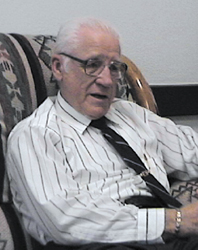|
“I
had no idea where I was going. We traveled all day long, and it was turning
dark when we got off the train…in Corpus Christi.”
|
|
 |
 |
|
Working
in Ship’s Service
|
|
|
-An
oral history of Fred Huebner
|
Home | Table of Contents | Previous Story | Next Story
Personal Profile | Student Perspective | Video Interview
|
For two years Fred Huebner managed to avoid conscription and to stay out of World War II. Because he worked for Reed Roller Bit Company producing struts for airplanes, the U.S. military granted Mr. Huebner three deferments. Ultimately, Fred was called into service in 1943. Since Mr. Huebner scored well on the military’s aptitude test, he was given a choice of service in either the Army or the Navy. “Well,” he says, “I guess I was kinda’ chicken because I didn’t like the idea of hand-to-hand battle . . . and I thought in the Navy, ‘Boom,’ from the ship you’d shoot way over on [to] the shore.” Mr. Huebner was dubbed a “Volunteer Inductee.” “I don’t know why they called it that because I didn’t volunteer,” he laughs.
Shortly after completing Boot Camp, Mr. Huebner was assigned to Ship’s Service “where the servicemen went and bought their food, drinks, ice cream, sodas, . . . gifts, cigarettes, and gasoline.” He was quite fortunate to receive this assignment because men working in Ship’s Service made an extra fifteen dollars a month for the overtime they worked. Later, Mr. Huebner would earn as much as sixty dollars a month although most servicemen doing the same job made only twenty-one dollars. “I was happy with what I was doing,” he reminisces, “because I was making probably more money than I would have otherwise. The only thing was, if I had ever gotten shipped out [to the front], I wouldn’t have had any rank.” Through diligence and hard work, Mr. Huebner and his coworkers made the Corpus Christi Ship’s Service a profitable business. He explains, “When I went over there, everything in Ship’s Service was going into the red—losing money—and they couldn’t figure out why. I figured it out right quick.” Fred suspected that some of the men who cleaned Ship’s Service after hours were stealing, so he padlocked all of the beer boxes, “and it went into the black. The money we made in Ship’s Service … went towards the war effort, to welfare things in the Navy,” he adds. Mr. Huebner’s management skills kept him safe in Texas and out of battle. Several times he was on or near the top of the Shipping List—the list of those scheduled to be shipped from the base, possibly to a war zone. For about a year, Mr. Huebner’s name stayed at the top of this list, but he was never shipped out. He was kept in Corpus Christi because of his good work. Others who caused trouble on the base were shipped out in his place. Fred smiles, “I was lucky. I never went … any place else. I stayed in Corpus Christi.” After a while, his wife, Margaret, moved to Corpus Christi and they were able to rent a small apartment near the base. Mr. Huebner worked in Ship’s Service until the end of the war and spent much of that time at its filling station. He clearly remembers the day the war ended. “We were all restricted to the base the night the war was over. Nobody could go ashore or into town except for the ones who were married or had apartments off base. . . . I was lucky; I was able to leave the base that night.” On January 8, 1946, after two years, four months, and fifteen days of service, Fred Huebner was discharged from the Navy. He and his wife returned to their life in Houston. |
 After
Fred decided to join the Navy, he reported to Union Station in downtown Houston
and was shipped to Corpus Christi. He recalls, “I had no idea where we were
going. . . . It was turning dark when we got off the train in Corpus Christi.”
During the eight weeks of boot camp, Fred and his fellow enlistees slept in
an old airplane hangar. He remembers keeping all of his belongings in a “seabag”
and the punishment he received when his seabag was found lying on the ground.
“I never will forget [it],” Mr. Huebner says. “We were all lined up . . .
to go to chow, and they called my name, and I had to step forward.” He then
had to march up and down a bulkhead “with that seabag with every belonging
that I had on my back.”
After
Fred decided to join the Navy, he reported to Union Station in downtown Houston
and was shipped to Corpus Christi. He recalls, “I had no idea where we were
going. . . . It was turning dark when we got off the train in Corpus Christi.”
During the eight weeks of boot camp, Fred and his fellow enlistees slept in
an old airplane hangar. He remembers keeping all of his belongings in a “seabag”
and the punishment he received when his seabag was found lying on the ground.
“I never will forget [it],” Mr. Huebner says. “We were all lined up . . .
to go to chow, and they called my name, and I had to step forward.” He then
had to march up and down a bulkhead “with that seabag with every belonging
that I had on my back.”